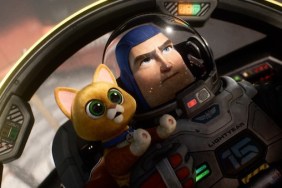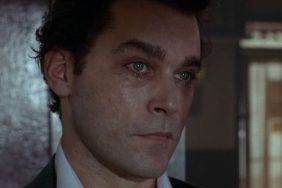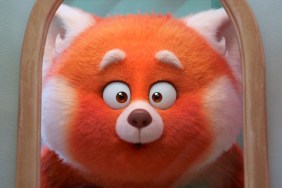It was 20 years ago this week that Pixar changed the world of animation forever. Toy Story, the first feature-length CG-animated movie, was a box office smash and a critical success that has become an all-time classic. What’s more, Pixar followed the original Toy Story with one rousing hit after another, developing an incredible reputation for quality that has earned the studio generations of fans, tons of awards, and a place in artistic history.
But what is the best film Pixar ever made? That’s the question that matters here on Crave’s Best Movie Ever. We asked Crave’s film critics William Bibbiani and Witney Seibold, and Collider’s Brian Formo, to choose just one Pixar movie that they think stands head and shoulders above the rest. And as usual, they couldn’t agree on a single thing.
Find out what they picked, let us know your favorites, and come back next week for an all-new installment of Best Movie Ever!
William Bibbiani’s Pick: WALL-E (2008)

Disney
What I admire most about Pixar is their ability to adapt high concepts into deeply emotional stories. It was hard for me not to select either of the Monsters movies for this particular assignment. I love the way Monsters Inc. uses the idea of monsters actually living in your closet to tell a tale fatherhood, propaganda and diminishing resources, and I get a real kick out of how Monsters University uses the college comedy genre to explore the personal impact of failure.
I could go on like that. Practically every Pixar film is a fun idea that gets transformed into something sensitive, if not profound. (Sorry, Cars movies, you’re the exception.) But WALL-E isn’t just a fun film with a heart, it’s powerful science-fiction. It’s the story of a society that neglects the call to meaningful action in favor of constant escapism, told via a member of the underclass who cleans up after mankind’s many messes. It is also the story of two robots in love.
WALL-E is pointed satire, beautiful animated (as always), and driven by an unexpected storyline that builds from the apocalypse, soars into the stars, and culminates in hope. Many fans love the opening, nearly dialogue-free portion of the film and decide that the journey into outer space, and the realization of what the human race has transformed into, is a frustrating change. But having watched WALL-E, over and over again, I see no other direction the tale can go. It is a story of consequence that works backwards, one that transitions from hope amidst a lifeless landscape to a vibrant but unsettling dystopia.
It is unlike any of the studio’s other films. It is unlike most films altogether. It is strange and special, and it touches the intellect and the heart in equal measure.
Brian Formo’s Pick: Toy Story 3 (2010)

Disney
When Pixar began (in 1995), I thought I was too old for animated movies. It took me a while to figure out that I was wrong. You see, Disney made movies that would appeal to kids and those kids would grow up to be adults who would have fond memories for them (and when those kids became parents they’d take their kids to Disney theme parks, and buy them Disney lunchboxes, notebooks, etc.), but a Pixar movie would loft jokes for the adults, while entertaining their kids. Pixar has gotten so good at entertaining adults, when I was watching Inside Out—and feeling sorry for my adult partner who was dealing with moving with me for my job, thousands of miles from her friends—I wondered out loud, what would children like about this movie with all these psychology jokes?
Toy Story, Woody and Buzz Lightyear, was the first film from Pixar. And it’s genius. What can entertain a child but also wink at the adults who brought them? Classic toys who don’t understand the new, loud toys that the audience’s children are playing with! But Toy Story taught adults that new toys are okay and it taught children that hand-me-down toys—and their own imagination—have value. Win win.
But kids can’t understand Toy Story 3! No way. That’s why it’s the best! Sure they might like all the different toys Woody encounters as he tries to escape from daycare, but they’ll never understand that this is an animated remake of The Great Escape (except Woody is our inner nerd—totally unsure of his physicality—and not the supercool motorcyclin’ Steve McQueen-heartbreak-machine). Nor can they comprehend the passage of time, broken relationships, or what it’s like to be discarded by someone who once loved you more than anything. But they do get Mr. Tortilla Head. And that, friends, is why Pixar is great. It gets adults’ heads swimming with cinephile and psychological thought—and makes kids giggle around them.
Witney Seibold’s Pick: Inside Out (2015)

Disney
Generally speaking, I find it critically irresponsible to declare any film from the last, say, five years to be the best of anything. I see this a lot in the critical world: A new gigantic hit film is released, and some critics – and many fans – immediately declare it to be the best film of all time. Usually it doesn’t take very long for consensus to cool, and usually within two years, few are talking about that picture anymore, and the rest are now caught up in the newest best movie ever. Immediate enthusiasm is not a good barometer to judge a film when seeking the greats.
So I beg complacency when I declare the best Pixar film to be one that was released a mere five months ago. Yes, dear readers, I declare that Inside Out is the best Pixar movie. For a studio that takes great stock in shifting perspective on familiar things (toys, closet monsters, cars), Inside Out has the highest concept yet. It is a story told from the perspective of an 11-yer-old girl’s emotional beings, represented by glowing person-shaped pixies that live inside her head. The emotions take turns controlling their human vessel, but the plucky Joy (Amy Poehler) always manages to remain the leader. And what does Sadness (Phyllis Smith) do? She’s often asked to sit in the corner.
Inside Out is one of the best children’s films I’ve ever seen on the topic of growing up. Other kid flicks tend to stress that growing up is the same as learning to handle sadness with dignity, and to get over it. Inside Out declares that sadness is a part of our makeup, and that true maturity is, when the time comes, the creation of Bittersweet. One cannot live for happiness. One has to live for the entire spectrum of emotional states. Inside Out is not just an amusing, high-concept Chuck Jones-ish string of clever psychology gags (although is it that). It’s also an unexpectedly rich film about the function of the emotions that control you (and, yes, emotions control us). This is also a film that offers a new perspective on your own emotional state. And that, I would say, is a grand success.
Top Photo: Disney
Previously on The Best Movie Ever:
The Best Movie Ever
-
The Best Movie Ever | Under the Sea

Is the best movie ever set underwater a family film about a fish or a World War II movie about a German submarine?
Photos: Disney / Pixar / Neue Constantin Film
-
The Best Movie Ever | Video Game Adaptations

There aren't a lot of good video game adaptations, and our critics just can't agree on which one is the best.
Photos: Universal Pictures / New Line Cinema / Dimension Films
-
The Best Movie Ever | Reptiles

Movies about slithery things aren't very common, so our critics are presenting their picks for the best reptile movies ever.
Photo: Warner Bros. / Paramount Pictures / New Line Cinema
-
The Best Movie Ever | Helena Bonham Carter

Is Helena Bonham Carter's best movie a classy costume drama or a twisted critique of contemporary masculinity?
Photo: Fine Line Features / Miramax Films / 20th Century Fox
-
The Best Movie Ever | Crime Comedies

What's the best comedy ever made about living a life of crime? Our critics present their picks.
Photo: MGM / Warner Bros. / Janus Films
-
The Best Movie Ever | Jodie Foster

The Oscar-winning actor/director is one of the most respected artists in the film industry. But what's her best movie ever?
Photo: Columbia Pictures / Warner Bros. / MGM Home Entertainment
-
The Best Movie Ever | Robert Downey Jr.

The man who would be Iron Man has had one of the most unusual careers in film history, but which movie is his best?
Photo: Warner Bros. Pictures / Paramount Pictures
-
The Best Movie Ever | Cats

Keanu may be a great comedy about a cat, but what's the best cat movie ever? Our critics picked some WEIRD films this week!
Photo: Drafthouse Films / United Artists / Kindai Eiga Kyokai
-
The Best Movie Ever | Charlize Theron

Is Charlize Theron's best movie the one that earned her an Oscar, or the one that kicked ass?
Photo: Warner Bros. / Newmarket Films
-
The Best Movie Ever | Ice Cube

It's been 25 years since Ice Cube made his acting debut. So what's his best movie ever?
Photo: Miramax Films / New Line Cinema / Universal Pictures
-
The Best Movie Ever | Dreams

What's the best movie ever made about dreams, dreaming or dreaminess? Our critics present their picks.
Photo: Films du Losange / Criterion / Fox Searchlight
-
The Best Movie Ever | Batman

Everybody loves Batman, but what's the best Batman movie ever? Our critics can't agree in this week's roundup.
Photo: 20th Century Fox / Warner Bros.
-
The Best Movie Ever | Superman

Batman v Superman isn't the best Superman movie ever, so we asked our stable of critics to decide which one is.
Photo: Warner Bros.
-
The Best Movie Ever | Justice

Let's celebrate this exciting new Dawn of Justice with a spirited debate about the best movie ever made about justice itself.
Photo: Koch-Lorber / 20th Century Fox / United Artists
-
The Best Movie Ever | John Goodman

The star of 10 Cloverfield Lane has had an astounding career, but what's his best movie ever?
Photo: Gramercy Pictures / 20th Century Fox
-
The Best Movie Ever | Die Hard Ripoffs

Die Hard spawned a whole genre of action movies that live on to this day, but which Die Hard ripoff is the best?
Photo: 20th Century Fox / Columbia Pictures / Golden Princess Film Production
-
The Best Movie Ever | Oscar Bait

'Oscar bait' isn't an insult, it's a genre. So what's the best Oscar bait movie ever?
Photo: The Weinstein Company / Universal Pictures
-
The Best Movie Ever | Witchcraft

What's the most bewitching movie ever made about witches? Our panel of critics narrows it down to two classic films.
Photo: Criterion / American International
-
The Best Movie Ever | Action Comedies

If Deadpool isn't the best action comedy ever, what is? Our panel of film critics make the case for their favorites.
Top Photo: Warner Bros. / RM Films International / 20th Century Fox
-
The Best Movie Ever | George Clooney

Everyone loves George Clooney, but none of our critics can agree on which film qualifies as his very best.
Photo: Buena Vista / Universal / Warner Bros.
-
The Best Movie Ever | Martial Arts

Our panel of critics fights over their picks for the best martial arts movie ever made. There can be only one!
Top Photo: Shaw Bros. / Warner Bros. / Toho
-
The Best Movie Ever | Creepy Dolls

Everyone's frightened of little toy people, but what's the creepiest creepy doll movie ever?
Top Photo: Universal Pictures / United Artists / New World Pictures
-
The Best Movie Ever | Modern Warfare

If 13 Hours isn't the best movie about our contemporary wars, what is? Our panel of critics weighs in.
Photo: Warner Bros./Columbia Pictures/Summit Entertainment
-
The Best Movie Ever | Revenge

If The Revenant isn't the greatest revenge movie, what is? Our film critics nominate some of the best films ever made.
Top Photos: Janus Films / Paramount Pictures / Tartan Films
-
The Best Movie Ever | Parties

We asked our critics to pick the best party movie ever made, and none of them picked a film about a frat house.
Photo: Warner Bros. / 20th Century Fox / Sony Pictures Classics
-
The Best Movie Ever | Quentin Tarantino

Is the Hateful Eight director's best film an autumnal romance or a World War II drama? Our critics can't decide.
Photos: The Weinstein Company / Miramax
-
The Best Movie Ever | Star Wars

Is A New Hope better than The Empire Strikes Back? Our critics debate the classics (and ignore the rest).
Photos: Disney / LucasFilm
-
The Best Movie Ever | Ron Howard

He's directed films in nearly every genre and won an Oscar for his troubles, but what's the best Ron Howard movie ever?
Photo: Touchstone / Universal / MGM
-
The Best Movie Ever | William Shakespeare

He's the most adapted author in movie history, but which William Shakespeare movie is the very best?
Photo: Top Photos: Toho / Paramount / Columbia
-
The Best Movie Ever | Pixar

Everyone has their favorite Pixar movie, but which one is the best?
Photo: Disney
-
The Best Movie Ever | Young Adult

Before you say goodbye to The Hunger Games, find out what our critics think was the best young adult movie ever.
Photo: Universal Pictures / Warner Bros.
-
The Best Movie Ever | Angelina Jolie

She's been acting for decades, directing for years, and winning our admiration forever. But what is Angelina Jolie's best film ever?
Photo: The Samuel Goldwyn Company / HBO / Columbia Pictures
-
The Best Movie Ever | James Bond

It's new school versus old school! Our critics debate which film qualifies as the best Bond movie ever.
Photo: MGM / Colombia Pictures / United Artists
-
The Best Movie Ever | Sandra Bullock

Our critics can only agree on one thing: the best Sandra Bullock movie isn't the one that got her an Oscar.
Photo: 20th Century Fox / Warner Bros.


![Who Is [Spoiler's] Killer on General Hospital?](https://www.mandatory.com/wp-content/uploads/sites/10/2024/12/General-Hospital-Sonny-Dex-Mandatory.jpg?w=182&h=122&crop=1)





